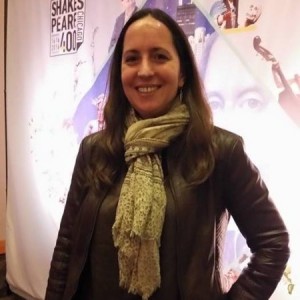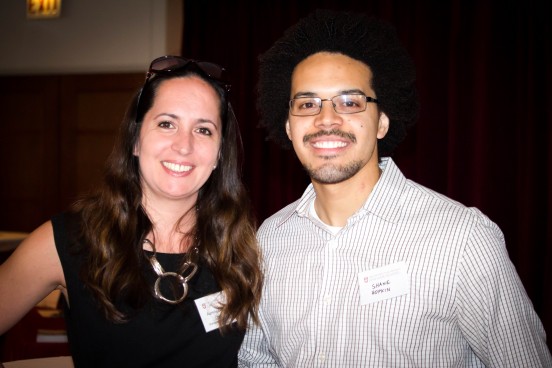The scientific tribulations of a French woman in the world
 There never was a single defining moment that led to Aurélie’s decision to become a scientist. She knew she would—had always known—in some obvious, yet unformulated, way. It came to its full conscious realization much later, but as far as she could remember, science had always been in her life.
There never was a single defining moment that led to Aurélie’s decision to become a scientist. She knew she would—had always known—in some obvious, yet unformulated, way. It came to its full conscious realization much later, but as far as she could remember, science had always been in her life.
First, there was Normandy and two toddlers racing through their grandparents’ house to get to “papi’s” office—an Ali Baba’s cave of sorts for curious children and science lovers. The very thought of that room always brought excitement to its pinnacle. Pushing its door transported them into a parallel universe filled with mysteries. It was populated with Galileo thermometers, spin tops, compasses, towers of books, and her ultimate favorite: the complete Jules Verne’s collection. Aurélie and her brother knew that papi would eventually join them and offer the highly anticipated word problem that only they could solve. “A magician has to be at his king’s palace at 9 a.m. It takes him ten minutes to get dressed, twenty minutes to eat and thirty minutes to ride his horse there. At what time should he get up?” Could one’s life be any more exciting?
Additionally, there were the conversations at the family table where science and learning would often become one topic presented by Aurélie’s dad in the most compelling ways. Back in the mid 1980s, college education in France was growing into a norm, but for the previous generations, it had hardly been a consideration unless you came from a privileged background. Things were now changing and Aurélie’s father wanted his children to have better life choices than he did. To him, college education was a synonym for “opportunity” and the focal point of conversation. Aurélie was paying attention. The more she studied, the more opportunities she had to escape the house chores. As great of an incentive as it was, she truly enjoyed studying, probably because her grandfather had already planted the learning seeds as a means to unravel the mysteries of the world.
High school, to some extent, was still a family affair where her grandfather taught as the main math instructor and her grandmother was the main French teacher. This arrangement maintained the comfort of home while putting pressure on her to do well. By then, Aurélie was debating between technical and traditional education. She eventually decided on an engineering program in biology that aligned well with her love for science and her desire to start working quickly. The program she chose was an interesting and extremely demanding two-year degree with an average of forty-five classroom hours per week. Research and lab work was exhilarating as she loved nothing more than working through the ins and outs of a problem and figuring out solutions. Meanwhile her parents were in the background, making a case for international study programs and the necessity of learning English. Aurélie was still paying attention. She was also getting more and more interested in the pharmacy sector and was finding out that many large pharma corporations at the time were Anglophone.
The early scientific excitement she had felt in her grandfather’s office was about to expand when in May 1999, a student recruitment team from Kingston’s College in London came to her school. Four quick months later, she was looking at the Thames River from her dorm, wondering why such an exciting turn of events had to coincide with the passing of the instigator of it all, the one person she would have wanted to share it with, her grandfather, who died shortly before her college education turned international. Aurélie immersed herself in her studies, a BSc (Hons) in biological science at Kingston. She also immersed in the campus life, enjoying as many multicultural opportunities as she could, mingling with international students and learning English. Her two-year program was followed by a three-month internship at St John’s hospital where she engaged in practical lab work on the HPV16 virus. This provided a very exciting introduction to molecular biology and confirmed her love of the lab environment. She discussed it with her professors and one of them told her that based on her outstanding marks she should consider a PhD program.
Aurélie’s scientific journey was about to take another international turn in 2001, when after being accepted into Kingston’s Molecular Biology PhD program, she packed her bags again to follow her thesis director to Memphis, Tennessee to conduct research at St. Jude Hospital.
St Jude was everything she had hoped it would be. Doing research in an institution that strived to offer free healthcare and working in close proximity with the patients and their families validated her decision to become a researcher. Hearing the patients’ stories, being a witness to their fears and hopes was, for Aurélie, the most compelling argument to pursue her research full-time. When her thesis director was transferred to the University of Chicago in 2007 to the Department of Pediatrics, Aurélie followed along to, as she notes, “stay open to new opportunities and avoid settling in my comfort zone. You have to be curious.”
It is because of her family’s tradition to keep learning and her natural curiosity that after the completion of her PhD in 2010 she continued to look for new learning opportunities. She was still heavily involved with her post doc activities trying to unravel the mechanisms of gene regulation when she heard about the Clinical Trials Management and Regulatory Compliance certificate at the Graham School. Continuing education was in perfect alignment with her lifelong learning philosophy. The professional and practical orientation of the program corresponded to her objective to closely work with patients. She was interested in getting deeply involved in patient-oriented research protocols. Becoming more proficient in clinical trials was a humbling way to understand the patient’s perspective. In many ways, some of which were very unexpected, the Clinical Trials certificate exceeded her expectations. Learning about transferable and applicable skills was a must. Having instructors who were all professionals in different areas of clinical trials led to incredible conversations and widened her perspective on professional directions she had never contemplated before. Since the completion of her certificate in 2015, she has been in regular contact with her classmates, as well as one of her instructors, Rich Wilson. Rich is now a mentor and, strangely, reminds Aurélie of that grandfather, whose love for sciences never ceases to inspire her.
Do not hesitate to contact me if you wish to have one of your students recognized or a particular classroom event featured in the PDP Newsletter. Karine Bravais: kbravais@uchicago.edu
AGENDA
Note from the Program Coordinator
BUILDING THE PDP COMMUNITY: What’s happening outside of the classroom?
New PDP Faculty and Staff
PDP STATE OF AFFAIRS 2015/2016: Mike Niederpruem’s update
STUDENT PROFILE: Aurélie Desgardin
FACULTY INTERVIEW: Genevieve Long
Twenty Facts on Student Affairs




